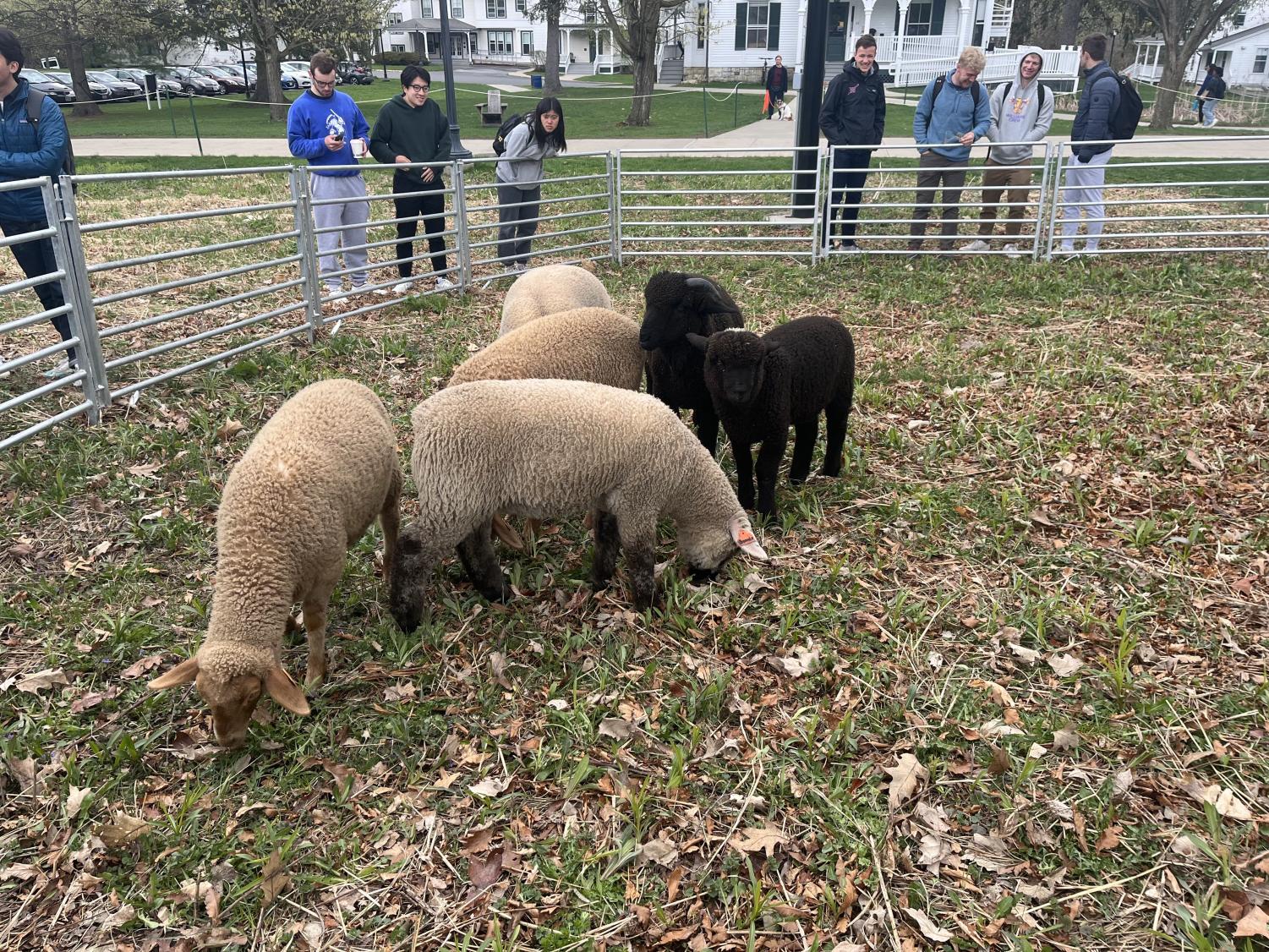Sheep schlep to campus for commemoration of Roman festival
April 26, 2023

At 1:24 a.m. on Wednesday, March 19, a curious message was delivered to the inboxes of slumbering students: “SHEEP COMING TO CAMPUS!” A perfect string of four words, if there ever was one.
The occasion? Parilia, an ancient Roman festival, that would soon be brought to campus by the classics department in collaboration with the Center for Environmental Studies, Zilkha Center, and Brattle Farm. A couple thousand years ago, Parilia was a birthday celebration for the city of Rome and for new flocks of sheep being led out to pasture. Last Wednesday, Parilia 2023! — as the event was called — served a triad of purposes for the event organizers: integrating animals with the natural landscape sustainably, connecting students and animals, and showcasing student projects from various classics classes.
Nicole Brown and Amanda Wilcox, both professors of classics at the College, co-organized the event, seeing it through from ideation to implementation. Their department, seeking innovative ways to connect students with the curriculum, had been considering a sheep-related event for several years, given how central sheep were to Roman culture. The Romans not only utilized their milk, meat, and wool, but they even held elections in a space called the “Sheepyard,” Brown told the Record.
The organizers modeled Parilia 2023! off the EweMass project at UMass Amherst, which seeks to bring sheep to campus for purposes of sustainable land management, environmental education, and reimagining a more integrated natural landscape.
“It’s very common for us to think that sheep belong out on farms in the countryside, and that a college campus, which is filled with meadows and green space, is designed for very different activities,” Brown said. “But, of course, for most of human history, and in many parts of the world today, landscapes are much more integrated.”
The EweMass project — which was in turn inspired by the Sheepmowers project at the University of California Davis — brings sheep to campus for a few days at a time to “mow” a patch of lawn by grazing, providing a more sustainable alternative to modern lawn care equipment and fertilizers.
In September 2022, Brown and Wilcox paid a visit to the second iteration of the EweMass project and met the organizers, whose help and experience were instrumental in putting together the proposal for Parilia 2023!, Brown said. With the model in place, finding the sheep was the next step, which was where the owners of Brattle Farm, Bill and Donna Chandler, came into the picture.
I spoke with Bill and Donna last Wednesday next to a pen for Bonnie, Brandy, Gigi, Isaac, Brock, and Allie — the four-month old lambs that were selected from a flock of 80 sheep to appear on campus (a 7.5 percent acceptance rate). As it turns out, bringing six sheep to campus comes with a lot of logistical difficulties.
“It’s a lot of schlepping,” Donna said. The Chandlers not only had to schlep the sheep over but also set up the pens and manage the difficulties of bringing the lambs off the farm for the very first time.
During early stages ofplanning, Brown and Wilcox worked with Deputy Director of the Zilkha Center Mike Evans to coordinate logistics and ensure the event would support campus sustainability efforts. They met with Facilities, Campus Safety Services, and the General Counsel’s Office to find the right location for the sheep, ensure the sheep’s safety, and reassure staff that the sheep were not aggressive or would pose a risk to student safety.
Their efforts finally came to fruition as students, staff, and Town residents swarmed around the pens last Wednesday with an intergenerational enthusiasm that the Chandlers and the event organizers agreed was gratifying to see.
“We invited the teachers and little kids from the Williams College Children’s Center to attend, and teachers brought over infants, toddlers, and preschoolers,” Wilcox said. “Since it was April vacation week for the public schools, we got visits from a lot of faculty kids who go to [local schools], too. I even saw a few retirees who live in town and take their daily walks on campus spending some time watching the sheep.”
The humans weren’t the only ones enjoying themselves. “It’s funny because the students think they’re here to see the sheep,” Donna said. “But I think the sheep think they’re here to see the students.”








